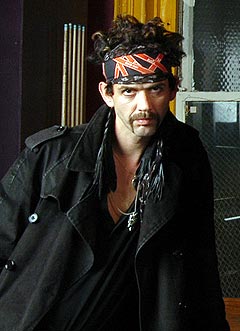Today's blog is a three-parter!
First, I was just listening to the radio and someone was talking about going on a cruise or going on holiday and reading books. I have to say, and feel free to quote me on this, "Don't go on holiday to read books, read books to go on holiday!" It really works, too. If it doesn't, you're doing it wrong.
Second, a friend of mine is doing a fund-raiser to raise money for cancer research. They are doing a sponsored "give up facebook for 40 days and 40 nights", something I'm sure most people would find hard to do. If you feel like sponsoring but are thinking "But I don't know her, how can I give her all my monies?" Well, look no further!
THIS website allows you to donate your money! Give generously, the internets are watching you...
And finally, the main attraction!
I've been thinking recently about conversations and I thought, with the help of four people I know, that I would describe my findings on "ways to be really bad at communication and how to improve". Also, by writing this stuff, I am in no way saying (or typing) that I am a great communicator, all I am saying is this is stuff I've realised I've been doing or other people around me have been doing.
My first case study:
This first person, I wont name names but I'm sure you all know someone like this. It is the person who always needs to say something but never says anything anybody needs to hear (and not in a good way). The problem with this is, however, that if you ever do have something useful to say, it will just be mixed in with all the rubbish and nobody will hear it. In the words of Thumper from Bambi, "If you don't have anything good to say, don't say anything at all." If more people did this, we'd all have far better conversations.
The second person I have noticed, and the person I was at one point, is the person who doesn't talk and doesn't listen to the conversation. You can't sit there wondering "Why don't people talk to me? And why am I not involved in conversations?" if you don't make the effort to listen to what people are saying? Just listen! It's not that hard.
The third person is a lot like the first one. This is the person who thinks they are hilarious but, no matter how many people tell them not to, they keep trying. This problem is far too widespread amongst our communities. If thinking you were funnier than you are was a symptom of swine flu, we wouldn't have to worry about water shortages.
The last person is possibly the most annoying of them all, and it's the person who is afraid of silence. I recently had a situation where I was around a person for a whole bunch more hours than I normally would be. This led to me having this issue. I'm sure there are people out there who, like me, require a bit of silence every now and then in which they can process their thoughts and chill out. People like this person don't seem to realise that conversation, like the tide, comes in flows. Sometimes conversation flows and people can talk freely and, at other times, there's just a bunch of dead starfish and jellyfish lying on the sand. Wait, what? I meant sometimes there is a lull in conversation. If people don't respect the lulls, conversation doesn't flow properly.
So, in conclusion, I was never very good at conversations. I'm pretty sure I have been every person mentioned above at one point, except the last one. And I'm still horrible at one on one conversations, by the way, However, in group conversations, what I did was to listen. Observe the conversation, see what makes the conversation continue, see how other people keep conversations interesting then, after a while, start adding in the odd comment, but only when it's something that needs said. Another useful tip is to remember who you're talking to, and remember that self-censorship is a good thing. If you're talking to Gordon Brown, he may not appreciate your "Your Momma" jokes. I think a lot of people think self-censorship is the same as being fake, something you should avoid at all costs, but it really isn't. It's one of the most important things to remember in a conversations.
So, what do you think? Do you think I'm accurate? Do you think I've missed something out or got something completely wrong? Lemme know!











